News
Cicilline touts Equality Act as House’s new senior gay member
Cicilline talks Equality Act in new role as senior LGBT House member
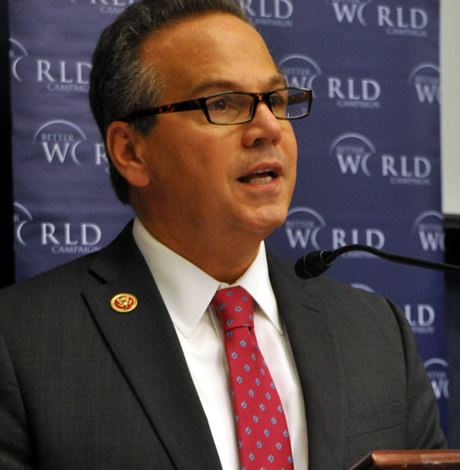
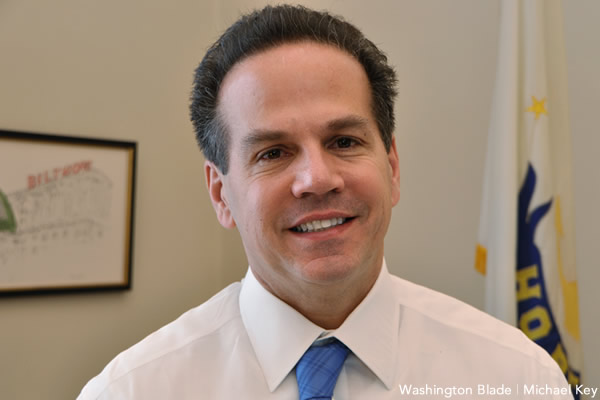
Rep. David Cicilline (D-R.I.) will become the most senior openly gay member of the U.S. House as Democrats take the majority this week. (Washington Blade file photo by Michael Key)
Rep. David Cicilline (D-R.I.) will become the most senior openly gay member of the U.S. House as Democrats take the majority this week, but he’s more excited about the growing ranks of openly LGB people who will serve in Congress alongside him and finally being able to move long-awaited legislation to ban anti-LGBT discrimination.
Asked by the Blade during an interview in his office Dec. 20 about his new distinction as the most senior out gay member of the House with outgoing Rep. Jared Polis leaving to become governor of Colorado, Cicilline said he’s “very proud” the chamber will have a net gain of two out LGB members in the 116th Congress and talked about the Equality Act.
“It’s a great privilege to be a part of that group,” Cicilline said. “I think this year will be an opportunity for us to finally move forward on the Equality Act, which I think is the single most important piece of legislation to our community in terms of, once and for all, prohibiting discrimination against members of the LGBT community as a matter of federal law. And so, I’m honored to be the senior most member and really excited about the new colleagues that are joining this caucus.”
(Although Cicilline is now the most senior openly gay person in the House, he’s not the most senior openly gay person in Congress. That distinction belongs to Sen. Tammy Baldwin of Wisconsin who was first elected to the House in 1998, but moved to the Senate and won re-election last year.)
The Equality Act would amend the Civil Rights Act of 1964 and the Fair Housing Act to ban anti-LGBT discrimination in employment, housing, public accommodations, jury service, education, federal programs and credit.
The bill also seeks to update federal law to include sex in the list of protected classes in public accommodation in addition to expanding the definition of public accommodations to include retail stores, banks, transportation services and health care services. Further, the Equality Act would establish that the Religious Freedom Restoration Act — a 1994 law aimed at protecting religious liberty — can’t be used to enable anti-LGBT discrimination.
Although the ongoing government shutdown will likely be the first priority for the Democratic majority, Nancy Pelosi said advancing the Equality Act would be a personal goal and the legislation will receive a bill number between 2 and 10.
And the lawmaker who’ll spearhead that legislation is Cicilline, who introduced the comprehensive non-discrimination measure in the previous two Congresses with Sen. Jeff Merkley (D-Ore.). For the first time, Democrats will introduce the Equality Act while controlling at least one chamber of Congress, which presents an opportunity for a floor vote on the legislation.
Cicilline said the timing for introduction for the Equality Act in the 116th Congress is yet to be determined, although it’ll definitely coincide with Merkley’s introduction of the legislation in the Senate. The Rhode Island Democrat said conversations with Democratic leadership on the timing for the legislation haven’t yet taken place “other than knowing we’re moving forward on it.”
“I know that the incoming speaker had made public statements about our intention to make the Equality Act a priority, which I’m delighted to hear,” Cicilline said.
Cicilline said he expects committees with jurisdiction over the Equality Act — such as the Judiciary Committee and the Education & the Workforce Committee — to hold hearings on the legislation before moving forward in accordance with regular order before the floor vote.
The next iteration of the Equality Act will have “pretty much” the same language as its previous iterations, Cicilline said. He added every time he reintroduces a piece of legislation “it’s another occasion to kind of look at the bill and see if there’s anything to change.”
“So we’ll go through that process, but it’ll be essentially the same bill,” Cicilline added.
Asked whether he had anything in mind that would make the Equality Act not the same in the 116th Congress, Cicilline replied, “No.”
In the previous Congress, all members of the Democratic caucus were co-sponsors of the legislation, except for two lawmakers: Rep. Dan Lipinski (D-Ill.), whom LGBT groups sought (unsuccessfully) to oust during the Democratic primary last year for not backing LGBT rights, and Rep. Marcia Fudge (D-Ohio).
Cicilline said he expects the same level of support in the Democratic caucus as it takes the majority in the 116th Congress.
“I’ve talked to a number of my new colleagues about the Equality Act, a number of them have already contacted me about wanting to be co-sponsor, so I expect will have the same kind of overwhelming Democratic support,” Cicilline said. “Hopefully, every Democrat will be a co-sponsor.”
Republicans however, are a different story. Only two Republicans co-sponsored the Equality Act in the last Congress. One of them is Rep. Ileana Ros-Lehtinen (R-Fla.), known for being the most pro-LGBT House Republican, who retired after 24 years in Congress. The other Republican co-sponsor, Rep. Scott Taylor (R-Va.), was voted out of office in the Democratic “blue” wave.
Cicilline said he’s had conversations on the Republican side of the aisle about the Equality Act and is “going to continue those because I want to do everything I had to make it bipartisan.
“I think it’ll be really important to have some of our Republican colleagues, but I don’t have any yet that are committed to it,” Cicilline added.
Asked whether there were any Republican possibilities he could name, Cicilline demurred.
“If I name them, they become less possible,” Cicilline said. “I’m going to explore with as many Republican colleagues as I can and get them on board.”
But the Equality Act also faces concerns among civil rights supporters. Many civil rights groups, including the Leadership Council on Civil & Human Rights, have said they support the goals of the Equality Act, but have stopped short of a full endorsement of the bill.
Fudge, who was considering a leadership challenge to Pelosi after Democrats won their majority, has expressed concerns about opening the Civil Rights Act to amendments on the House floor, where the landmark legislation could be watered down.
“What I opposed was including the Equality Act in the current Civil Rights Act,” Fudge said in a statement. “The Civil Rights Act is over 50 years old and isn’t even adequate to protect the people currently in it. I want us to do a new and modern civil rights bill that protects the LGBTQ community and updates protections for this era. I do not believe it is appropriate to open and relitigate the current Civil Rights Act.”
Cicilline said the Leadership Council on Civil & Human Rights made “a very strong statement of support of equality for our community” in regards to the Equality Act. As for Fudge’s concerns, Cicilline said he understands them, but doesn’t share them.
“I understand the argument advanced by Congresswoman Fudge,” Cicilline said. “I disagree with it. I think that we can’t have full equality by having a separate but equal civil rights bill.”
Cicilline said barring discrimination against LGBT people by amending the Civil Rights Act of 1964 has significant benefits that a different bill couldn’t accomplish. Among these benefits is applying more than 50 years of jurisprudence of the landmark law to anti-LGBT discrimination.
“Really the only way to do it is to include it in the existing civil rights architecture, so you have the benefit of all that jurisprudence whenever exemptions exist, whenever other kinds of tests need to be applied,” Cicilline said. “There’s significant jurisprudence on it, and so it saves kind of litigating all these things again. So, I think there’s real value legally and real value in terms of making a strong statement that we need for equality.”
Cicilline pointed out that every other member of the Congressional Black Caucus was a co-sponsor of the Equality Act, including civil rights icon Rep. John Lewis (D-Ga.), whom Cicilline said was “one of the early champions of the bill, and he’s a respected leader in that community.”
After the Equality Act passes the House, the game changes. Instead of a new Democratic majority, the U.S. Senate under Senate Majority Leader Mitch McConnell (R-Ky.) has an expanded Republican majority. Moreover, President Trump would need to sign any legislation for it to become law.
But Cicilline denied passage of the Equality Act in the House is the end of the story. In fact, he called it the “beginning of the story” because the campaign to pressure Republicans to support LGBT rights will begin.
“We will work hard to get it passed in the Senate,” Cicilline said. “I think this is one where it’s very critical for outside groups to play a role in identifying who are the key senators who are at least willing to consider supporting the Equality Act and that they hear from constituents in their districts from the LGBT community and allies about the importance of this, and we begin a real campaign to persuade them to do it.”
Referencing polls showing the American public opposes discrimination against LGBT people, Cicilline said the issue “is one where the American people are way ahead of us overwhelmingly.”
“I think part of our challenge is to catch up to where the American people are,” Cicilline said. “They understand fundamentally that discrimination is wrong. It’s antithetical to the fabric that is this country. And when you give them the examples of the kind of discrimination we’re talking about they’re opposed to it. So I think this is about kind of Congress basically catching up to where the rest of the country is and making certain that qualified people cannot be fired from their jobs, cannot be kicked out of housing.”
Cicilline also wouldn’t rule out Trump supporting the Equality Act, recalling an interview Trump gave in 2000 to The Advocate in which he said he likes the idea of adding sexual orientation to the Civil Rights Act of 1964. Trump hasn’t said whether he still holds that position.
“It’s hard to know that he’ll continue to maintain that position, especially when you think of the ways the administration has behaved, but if we bill pass the bill soon, that’s our next effort,” Cicilline said.
The third branch of the U.S. government may also have a chance to weigh in on anti-LGBT discrimination. Two petitions are pending before the Supreme Court calling on justices to affirm anti-gay discrimination amounts to sex discrimination under current law, and another petition seeks clarification on whether anti-trans discrimination is sex discrimination.
For decades, courts have more or less consistently found anti-trans discrimination is sex discrimination. Court rulings finding anti-gay discrimination is sex discrimination are a relatively new development, but a growing number of them are reaching that conclusion.
In the event the Supreme Court decides to take up these cases, Cicilline said either way justices would come down, it wouldn’t change the need for the Equality Act.
“It’s one tiny piece of this bill,” Cicilline said. “So it would answer that question, but if it was answered and said it is covered that would be great because we have some partial coverage, partial protection against discrimination for one part of the community but it doesn’t solve the problem and it would still, I think, wouldn’t in any way undermine the necessity of passing and enacting the Equality Act. If they rule against it, then it just affirms the emergency of passing the Equality Act. So, I don’t know that it has a big impact.”
The Equality Act isn’t the only LGBT issue Cicilline has spearheaded. Last year, when the nation was horrified over the Trump administration’s “zero tolerance” immigration policy that separated asylum-seekers from their children, Cicilline pointed out the LGBTQ youth in immigration detention facilities have no legal protections.
Cicilline said “there may, in fact, be some implications of the Equality Act” in the context of immigration detention in terms of if there were educational facilities or it was considered a public accommodation.
“They did not have in place any protocols or systems,” Cicilline said. “They acknowledged that when issues arise related to the sexual orientation or gender identity of youth they deal with it on a case-by-case basis, whatever that means. But it was clear there aren’t established protocols that protect this vulnerable population. This is one of many, many shortcoming in the current immigration detention proceedings.”
The treatment of LGBT youth in immigration detention facilities, Cicilline said, will be the subject of congressional oversight with the House under Democratic control.
“I think you’ll see a lot of oversight hearings on this when we take the majority in January,” Cicilline said.
That isn’t the only LGBT issue facing expected congressional oversight for Cicilline, who identified other areas he predicts will come under scrutiny.
“The same things that exist in the immigration system context exist in the criminal justice system, so protections are in place for the people in our community who are incarcerated,” Cicilline said. “There’s lots of work that needs to be done in terms of protecting students, particularly with Betsy DeVos’ rollback of some key protections.”
One LGBT issue that has reemerged is reports of anti-gay human rights abuses, including the extrajudicial killing of gay people in concentration camps, in the Russian semi-autonomous Republic of Chechnya. Last month, the State Department promoted a report from the Organization for Security for Cooperation in Europe corroborating those reports and finding Russia “appears to support the perpetrators rather than the victims.”
Cicilline said the report “confirmed what we suspected from the beginning” and found an earlier Russian investigation that found no abuse “was not legitimate.”
“We have attempted in a variety of different ways to raise that issue both by introducing and passing a resolution in Congress condemning that action as well as leading a letter to the president and secretary of state urging him to raise this issue with — abuse of LGBT people in Chechnya — with the Russian officials,” Cicilline said. “So this confirms what we have attempted to do and sadly is just another example of people from our community suffering violence and discrimination and brutality and really unforgiveable circumstances.”
The Trump administration has sanctioned Chechen leader Ramzan Kadyrov under the Magnitsky Act and supported the OSCE report, but Trump himself has said nothing about the abuses, unlike other world leaders such as Justin Trudeau, Theresa May, Emmanuel Macron and Angela Merkel.
Asked what the Trump administration or new House majority should do, Cicilline said “we just have to continue to press for human rights,” raising the possibility of legislation and sanctions.
“I think there’s some legislative stuff we can do,” Cicilline said. “I think we should continue to bring attention to these issues, continue to express condemnation when appropriate with sanctions, etc. So I think there’s a whole range of options available to us, but raising our voices and making sure that America continues to be a country that speaks out against violence against the LGBT community is really important.”
Asked what would need to happen to trigger sanctions, Cicilline said “we have current mechanisms,” but other proposals are in the works through the legislative process.
With a Democratic majority taking control of the House, Cicilline said the distinction between Democrats and Republicans on LGBT rights will exemplify the new tone in Washington.
“I think the contrast is really stark and, I think people have a right to expect that the Democrats who take the House back that LGBT equality and protecting the LGBT community from discrimination will be an important priority for us and, I think, the community should be excited about having at least one chamber that fundamentally respects who we are and is committed to fighting for our equality,” Cicilline said.
Although the House is just one chamber of Congress and Trump still occupies the White House, Cicilline said the distinction between Democrats and Republicans on LGBT rights will shine a light for the American public in time for the 2020 election.
“So this is a big change and we’re either going to get the Equality Act passed in the Senate after it passes the House and have equality, or we’re not,” Cicilline said. “And we’re going to be able to demonstrate who stopped our fight for equality, and those people will be on the ballot in two years.”
Cicilline added, “Our community will work to elect people who do support equality, so this is an important one, but the work isn’t done, so we got a lot of work ahead of us. Fights for equality are never easy, even though they seem obvious to us.”
AIDS and HIV
Congresswoman Maxine Waters introduces new resolution for National Black HIV/AIDS Awareness Day
H.Res.1039 supports more funding, resources and awareness for Black American communities, who are disproportionately impacted by HIV/AIDS.

Today is National Black HIV/AIDS Awareness Day. Advocates established this day of awareness on Feb. 7, 1999, and nearly 30 years later, Black communities in the U.S. continue to be disproportionately impacted by HIV.
On Wednesday, California Congresswoman Maxine Waters introduced H.Res.1039, a resolution that supports the goals of National Black HIV/AIDS Awareness Day and calls for a collective commitment to address disparities Black people with HIV face. Waters represents the state’s 43rd congressional district, a majority Black and Brown population comprising South L.A. cities like Hawthorne, Gardena, and Inglewood.
In the resolution, Waters urges state and local government officials, as well as their public health agencies, to acknowledge the importance of this awareness day and encourage their constituents to get tested for HIV. The resolution also requests that the Secretary of Health and Human Services prioritize distributing grant funding to minority-led, HIV organizations and community-based approaches to fighting HIV stigma, LGBTQ+ discrimination, and racism.
In 2023, young Black men accounted for 47% of new HIV diagnoses among youth, while young white men made up 3% of these diagnoses, according to a new Williams Institute report. Black women also have the highest HIV diagnosis rate among women, and Black community members overall represent 38% of new HIV diagnoses and 39% of people living with HIV in the U.S., despite being only 12% of the national population.
Beyond the disproportionate rates of infection and diagnosis amongst Black Americans, these communities also face greater difficulties in accessing the medical care needed to prevent and treat HIV. In the same year, white Americans were 7 times more likely to access Pre-exposure Prophylaxis (PrEP) compared to Black Americans, a data point that affirms racial and healthcare inequities Black people continue to face in the U.S.
“[This] is a day to commemorate the impact of HIV/AIDS on Black Americans and encourage continued efforts to reduce the incidence of HIV, eliminate health disparities, improve access to care and treatment, and show support for all those who are living with HIV/AIDS,” said Congresswoman Waters, in a press release.
Waters has been an advocate for people impacted by HIV/AIDS since the peak of the crisis in the 1980’s. In 1998, she worked to establish the Minority AIDS Initiative, which expanded national prevention and treatment efforts in support of minority communities, who remain disproportionately impacted by HIV. In 2025, Waters introduced the “HIV Prevention Now Act” as well as the “PrEP and PEP are Prevention Act,” to increase prevention efforts and reduce health insurance barriers to access preventative resources, respectively.
H.Res.1039 is the latest addition to the congresswoman’s efforts to raise awareness for Black and other minority communities impacted by HIV/AIDS, and to fund and support on-the-ground efforts that prioritize their care and wellbeing.
The resolution is endorsed by various LGBTQ+ organizations mobilizing for communities impacted by HIV, including AMAAD Institute (Arming Minorities Against Addiction and Disease), LA Pride, AIDS Foundation Chicago, and PFLAG National. The resolution is also co-sponsored by 29 other U.S. representatives, including fellow California congressmembers Robert Garcia, Laura Friedman, Nanette Barragán, Sydney Kamlager-Dove, Lateefah Simon and Mark Takano.
H.Res. 1039 has been referred to the House Committee on Energy and Commerce, and currently awaits further action.
Kristie Song is a California Local News Fellow placed with the Los Angeles Blade. The California Local News Fellowship is a state-funded initiative to support and strengthen local news reporting. Learn more about it at fellowships.journalism.berkeley.edu/cafellows.
Los Angeles
Project Angel Food is now able to feed 10,000 people daily with expanded building
On Thursday, community gathered to celebrate Project Angel Food’s new kitchen and campus building, which allows them to serve more of the county’s critically ill community.

On Feb. 5, community members gathered at 922 Vine Street to celebrate the expansion of Hollywood-based non-profit Project Angel Food. That Thursday morning, the organization cut the ribbon for its Chuck Lorre Family Foundation Kitchen and Campus: one of two new buildings that greatly increase its capacity to provide healthy food and nutritional resources to the county’s critically ill community members.

Project Angel Food was founded in 1989 by author and activist Marianne Williamson and blossomed from a dire need to feed people impacted by HIV/AIDS during the epidemic. Today, the organization cooks and delivers over 1.5 million meals, tailored to specific needs that include chronic illnesses and gastrointestinal issues, to 5,000 people across Los Angeles.
In August 2023, the organization launched its “Rise to the Challenge” campaign, a multi-year expansion and renovation project backed by $51 million. Now, its first phase is complete, and its impact is expected to double.
With the new Chuck Lorre Family Foundation Kitchen and Campus, Project Angel Food’s kitchen staff — which, like the rest of the organization, is majorly powered by volunteers — has access to 16,000 square feet of expanded space, which includes more ovens, walk-in freezers, and hot cook lines than they’ve ever had access to previously. Project Angel Food CEO Richard Ayoub explained today that this will allow staff and volunteers to serve 10,000 people a day.
The organization’s executive chef, John Gordon, explained to the Blade that “space issues” were a major hindrance previously. Before the new kitchen was opened, staff worked out of a much smaller Lincoln Heights facility. “If you didn’t get the rack, you don’t have the sheet pans. If you got the sheet pans, you don’t have the last chiller,” Gordon said, explaining how difficult it was before to balance multiple tasks in the same space. Now, their team of seven chefs, 12 kitchen assistants, dishwashers, and volunteers can work in several cook lines at the same time.

“We’re much more efficient this way,” Gordon continued. In the kitchen, the day begins at 8 a.m. Someone will pick music for the morning, setting a groove for staff as they sync up to review recipes, pack meals prepared from the day before, and cook meals for the next day ahead. After a lunch break, they continue to work until 4 p.m. to make sure they’re meeting the needs of the community they serve.
For locals like Celeste, a Project Angel Food client who is affected by multiple sclerosis, this service is crucial. On days the disability “really takes effect,” being able to receive nutritious meals customized to her needs makes a meaningful difference. “Some days, I’m not able to get up,” Celeste said. “Just that one meal [can] give me an extra boost [and] allow that sun to shine brightly even on my rainy days.”
For advocates and Project Angel Food supporters, Thursday’s celebration was also an act of resistance and a bold declaration against the federal administration. Jamie Lee Curtis, the honorary co-chair of the “Rise to the Challenge” campaign, spoke of the “love” that lay at the core of Project Angel Food’s foundation: a kind of love she finds completely absent in the federal administration.

“We are a community here today the same way they are in Minnesota, and I feel like what they’re doing is what we’re doing,” Curtis said to the crowd, defiance firm in her voice. “And we’re only going to get any shit done if we do it together and defy these motherfuckers.”

County supervisor Lindsey Horvath, a former delivery volunteer at Project Angel Food, affirmed this statement and guaranteed the county’s continued support in the organization. Horvath spoke of the government’s “glaring absence” during the HIV/AIDS epidemic: one that is “eerily similar” to its attitude now.
As the government mobilizes Immigration and Customs Enforcement (ICE) agents, sending immigrant communities spiraling into crisis, on-the-ground organizations like Project Angel Food are standing in firm support of their marginalized and ill community members. Horvath’s confirmation of county support is also rooted in this mission.
The building’s exterior also reflects the organization’s dedication to its residents. On the south side, a new large-scale mural painted by esteemed local muralist Robert Vargas highlights the stories of local volunteers and vendors who live and work in the neighborhood. Vargas explained that seeing these people in action “crystallized” the dedicated service and harmony that exists among the organization’s volunteers, clients, staff, and nearby community members.

Next, the second building of the Chuck Lorre Family Foundation Kitchen and Campus begins construction this summer. This space will house the organization’s nutrition, volunteer, and client services and will also include its first department dedicated to research and policy. There will also be a training kitchen, where clients will be able to learn how to cook meals on their own.
As Project Angel Food’s growth continues, Ayoub hopes community members who are able to pitch in will do so. While public funding can feel unsteady, he explained, community strength and sustainment can fill those gaps of doubt. The organization is $2.3 million away from its goal in securing capital for this second building, and Lorre will match donations up to $1.5 million.
Kristie Song is a California Local News Fellow placed with the Los Angeles Blade. The California Local News Fellowship is a state-funded initiative to support and strengthen local news reporting. Learn more about it at fellowships.journalism.berkeley.edu/cafellows.
Arts & Entertainment
2026 Best of LGBTQ LA Readers’ Choice Award Nominations
Nominations for the Best of LGBTQ LA Awards are open from until February 15th!

It’s time to celebrate the vibrant and diverse LGBTQ+ community of Los Angeles! Nominations for the Best of LGBTQ LA Awards are open from until February 15th, giving you the chance to highlight your favorite local legends, hotspots, performers, and change-makers. Then, from February 23rd to March 6th, cast your vote for the finalists and help decide who truly represents the best of LGBTQ LA. The Best of LGBTQ LA Awards Party will be held on March 26th at The Abbey!
Use the form below or click the link HERE to nominate!
Italy
44 openly LGBTQ+ athletes to compete in Milan Cortina Winter Olympics
Games to begin on Friday

More than 40 openly LGBTQ+ athletes are expected to compete in the Milan Cortina Winter Olympics that open on Friday.
Outsports.com notes eight Americans — including speedskater Conor McDermott-Mostowy and figure skater Amber Glenn — are among the 44 openly LGBTQ+ athletes who will compete in the games. The LGBTQ+ sports website also reports Ellis Lundholm, a mogul skier from Sweden, is the first openly transgender athlete to compete in any Winter Olympics.
“I’ve always been physically capable. That was never a question,” Glenn told Outsports.com. “It was always a mental and competence problem. It was internal battles for so long: when to lean into my strengths and when to work on my weaknesses, when to finally let myself portray the way I am off the ice on the ice. That really started when I came out publicly.”
McDermott-Mostowy is among the six athletes who have benefitted from the Out Athlete Fund, a group that has paid for their Olympics-related training and travel. The other beneficiaries are freestyle skier Gus Kenworthy, speed skater Brittany Bowe, snowboarder Maddy Schaffrick, alpine skier Breezy Johnson, and Paralympic Nordic skier Jake Adicoff.
Out Athlete Fund and Pride House Los Angeles – West Hollywood on Friday will host a free watch party for the opening ceremony.
“When athletes feel seen and accepted, they’re free to focus on their performance, not on hiding who they are,” Haley Caruso, vice president of the Out Athlete Fund’s board of directors, told the Los Angeles Blade.
Four Italian LGBTQ+ advocacy groups — Arcigay, CIG Arcigay Milano, Milano Pride, and Pride Sport Milano — have organized the games’ Pride House that will be located at the MEET Digital Culture Center in Milan.
Pride House on its website notes it will “host a diverse calendar of events and activities curated by associations, activists, and cultural organizations that share the values of Pride” during the games. These include an opening ceremony party at which Checcoro, Milan’s first LGBTQ+ chorus, will perform.
ILGA World, which is partnering with Pride House, is the co-sponsor of a Feb. 21 event that will focus on LGBTQ+-inclusion in sports. Valentina Petrillo, a trans Paralympian, is among those will participate in a discussion that Simone Alliva, a journalist who writes for the Italian newspaper Domani, will moderate.
“The event explores inclusivity in sport — including amateur levels — with a focus on transgender people, highlighting the role of civil society, lived experiences, and the voices of athletes,” says Milano Pride on its website.
The games will take place against the backdrop of the U.S. Olympic and Paralympic Committee’s decision to ban trans women from competing in women’s sporting events.
President Donald Trump last February issued an executive order that bans trans women and girls from female sports teams in the U.S. A group of Republican lawmakers in response to the directive demanded the International Olympics Committee ban trans athletes from women’s athletic competitions.
The IOC in 2021 adopted its “Framework on Fairness, Inclusion and Nondiscrimination on the Basis of Gender Identity and Sex Variations” that includes the following provisions:
• 3.1 Eligibility criteria should be established and implemented fairly and in a manner that does not systematically exclude athletes from competition based upon their gender identity, physical appearance and/or sex variations.
• 3.2 Provided they meet eligibility criteria that are consistent with principle 4 (“Fairness”, athletes should be allowed to compete in the category that best aligns with their self-determined gender identity.
• 3.3 Criteria to determine disproportionate competitive advantage may, at times, require testing of an athlete’s performance and physical capacity. However, no athlete should be subject to targeted testing because of, or aimed at determining, their sex, gender identity and/or sex variations.
The 2034 Winter Olympics are scheduled to take place in Salt Lake City. The 2028 Summer Olympics will occur in Los Angeles.
Obituary
Catherine O’Hara, ‘Schitt’s Creek’ star and celebrated queer ally, dies at 71
O’Hara is remembered for memorable comedic roles in ‘Beetlejuice’ and ‘Home Alone’

Catherine O’Hara, the varied comedic actor known for memorable roles in Beetlejuice, Schitt’s Creek, and Home Alone, has died at 71 on Friday, Jan. 30, according to multiple reports. No further details about her death were revealed.
O’Hara’s death comes as a shock to Hollywood, as the Emmy award-winning actor has been recently active, with roles in both The Studio and The Last of Us. For her work in those two shows, she received Emmy nominations for outstanding supporting actress in a comedy series and outstanding guest actress in a drama series.
In 2020, O’Hara won the Outstanding Lead Actress in a comedy series award for her work in the celebrated sixth and final season of Schitt’s Creek. She was also known as a queer ally and icon for her theatrical and often campy performances over multiple decades. In Schitt’s Creek, she played Moira Rose, the wig-loving mother of David Rose (played by series creator Dan Levy). David is pansexual, but the characters around him simply accept him for who he is; the show was embraced by the LGBTQ+ community with how naturally David’s sexuality was written and portrayed. That show ran from 2015 to 2020 and helped bring O’Hara and her co-stars into a new phase of their careers.
In a 2019 interview with the Gay Times, O’Hara explained why the show got LGBTQ+ representation right: “Daniel has created a world that he wants to live in, that I want to live in. It’s ridiculous that we live in a world where we don’t know how to respect each other and let each other be. It’s crazy. Other shows should follow suit and present the world and present humans as the best that we can be. It doesn’t mean you can’t laugh, that you can’t be funny in light ways and dark ways. It’s all still possible when you respect and love each other.”
Additional credits include SCTV Network (for which O’Hara won a writing Emmy), Beetlejuice Beetlejuice, Curb Your Enthusiasm, Six Feet Under, Best in Show, Home Alone 2: Lost in New York, and Dick Tracy. O’Hara also lent her voice to The Nightmare Before Christmas, Chicken Little, Monster House, and Elemental. O’Hara was expected to return for Season 2 of The Studio, which started filming earlier this month.
Los Angeles
Community members urge city council to invest in trans lives
Advocates introduced the TGI Wellness and Equity Initiative, a campaign that would direct crucial funding to trans, gender expansive and intersex community organizations.
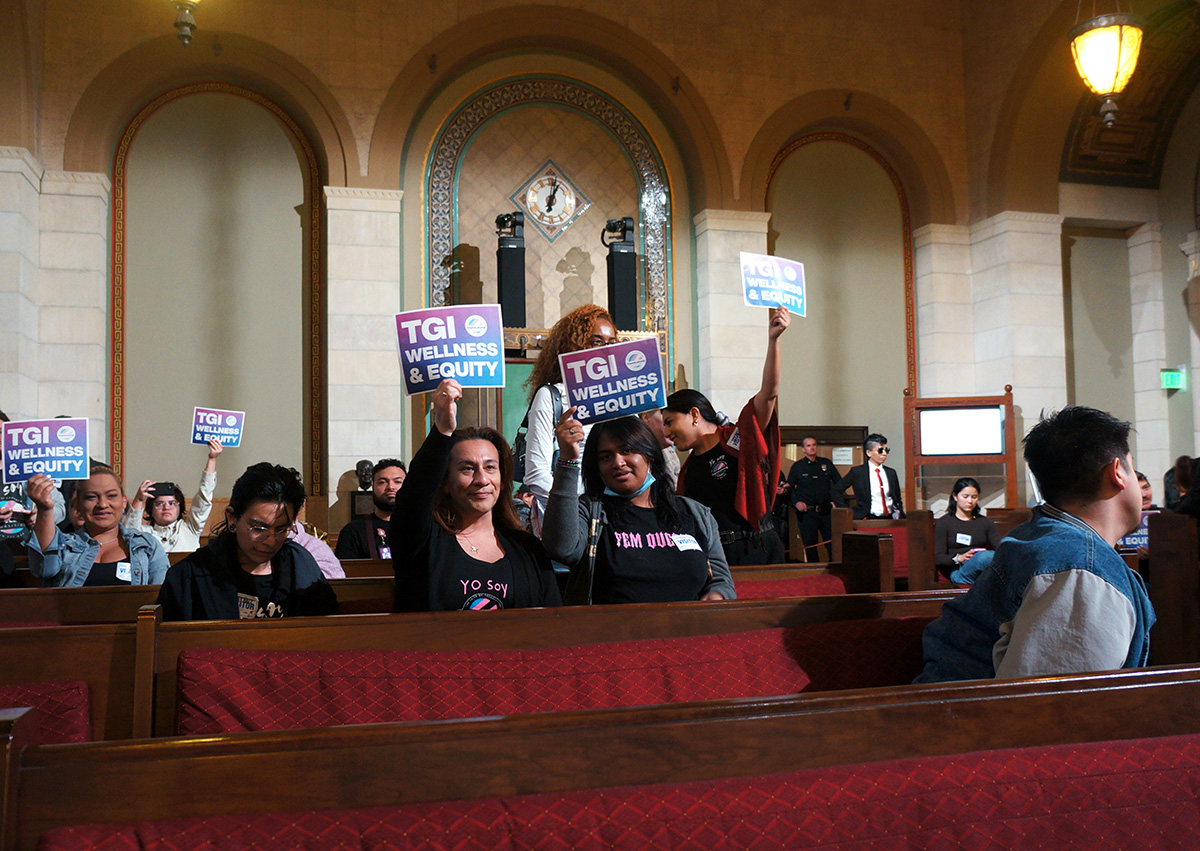
At 9 a.m. on Tuesday, ahead of L.A.’s regular city council meeting, a long procession of people wrapped around the entrance leading into the council chamber. Someone remarked that it was “unprecedented” to see so many people gathered, waiting to get inside. Several housing advocates and legal experts were waiting to make public comments about Measure ULA, otherwise known as the county’s “mansion tax.”
Another fifty or so transgender, gender expansive and intersex (TGI) advocates from the TransLatin@ Coalition (TLC), a long-standing organization that provides housing and meal support, legal services, mental health guidance and peer support groups, showed up to demand real, tangible support on behalf of themselves and their community members as the Mayor prepares the city’s budget on how funds will be allocated.
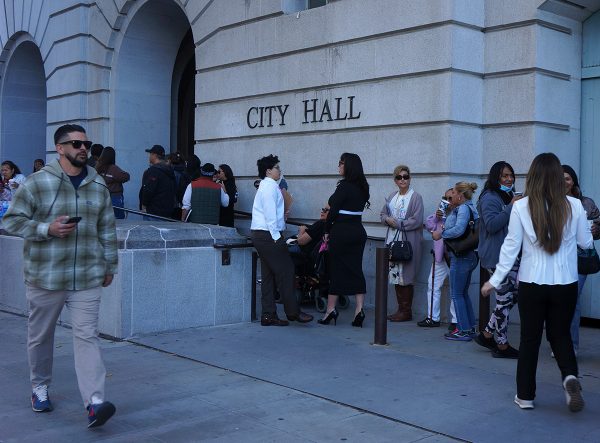
TLC advocates called on the city council to invest in their TGI Wellness and Equity Initiative (TGI WE), a two-year pilot program that would provide $4 million to five organizations that support the safety and rights of local TGI people. This money would expand each organization’s ability to hire more staff and expand their outreach, resources, and ability to serve a continually underserved community: TGI Angelenos who are multiply marginalized as violence against trans people and immigrants continues to increase.
During public comment, TLC president and CEO Bamby Salcedo requested that the council move forward with the initiative. Aside from general support, she asked that two council members act as co-sponsors and petitioners for the initiative. This way, TGI WE can be added as an official agenda item for future city council meetings, which would get the ball rolling for the initiative’s funding goals.
“Right now is the time to stand in solidarity with our community and stand against the federal government, who is attacking and trying to disappear trans people,” Salcedo told council members. Several other advocates, including TLC policy ambassador ChiChi Navarro, Christopher Street West board member NiK Kacy and Invisible Men director Jovan Wolf delivered passionate statements in support of TGI WE.
“Los Angeles is in a state of crisis, and our communities are running out of time,” Navarro told the council. They also spoke to the county’s growing investment in LAPD, while TGI organizations receive nothing. “This is not a resource shortage. It is a resource allocation choice [that] is costing lives. We need this council to introduce the TGI Wellness and Equity initiative immediately…We cannot wait. We need urgent investment today.”
TGI WE would fund community-run organizations that focus on individualized care that is facilitated with language support and sensitivity training, a kind of care that is crucial for TGI community members who often face criminalization and discrimination at the hands of law enforcement agents.
“We are their lifeline, and we demand your support,” Jovan echoed. “It’s time for the city of L.A. to make good on its promises to be for everyone…You and all of us know that we have been marginalized, pushed to the sidelines, and we continue to be an afterthought in your budgets and your agendas.”
When the meeting concluded, TLC members rallied together for a demonstration, calling out: “Support trans lives!” as council members filed out of the chambers.
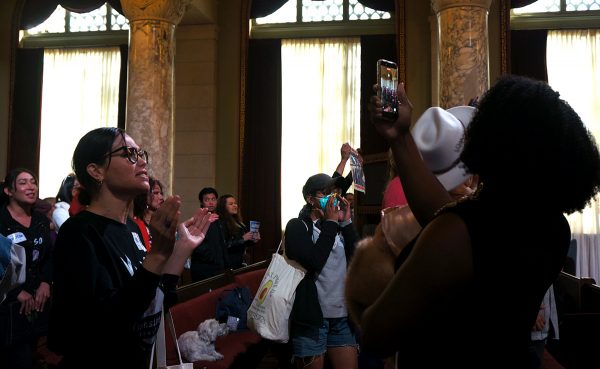
On the quiet walk back onto the street outside, Navarro reflected on the importance of this meeting and the effort community members made to be there. “A lot of the time, not just city council, [but] groups in general tend to forget trans people,” Navarro told the Blade. “Trans people are here. You saw today: clearly, we’re not a small pocket. I think we have to show them: we’re here [and] we’re not going anywhere.”
“It’s not great to be left in a place where you’re expected to continue to do the work, but without any actual support,” Navarro continued. Besides concrete funding, official citywide support for TGI WE would affirm that elected officials are willing to take a stance and take meaningful action when it comes to supporting TGI community members. “So it’s not just the money,” Navarro said. “L.A. has a motto, [that] L.A.’s for everyone. But I don’t know how you can say that when you’re not doing everything in your capacity to protect everyone.”
Kristie Song is a California Local News Fellow placed with the Los Angeles Blade. The California Local News Fellowship is a state-funded initiative to support and strengthen local news reporting. Learn more about it at fellowships.journalism.berkeley.edu/cafellows.
Los Angeles
UCLA’s long-standing LGBTQ+ alumni organization welcomes new president
The Blade sat down with paralegal studies professor and local advocate Bobby Rimas to talk about intersectional leadership and his goals for the UCLA Lambda Alumni Association.

As a young student studying history at UCLA, Bobby Rimas was grounded by his growing desire to give back to his community. He worked as a tutor for low-income students and became invested in learning about the ways intersectionality impacts people’s access to education and resources. “My barriers may not be the same as yours, and your barriers may not be the same as mine,” Rimas told the Blade. “How do you apply that in leadership [and] in the classroom?”
After 15 years of service to UCLA’s various alumni networks, first beginning with the Pilipino Alumni Association, Rimas became president of the university’s Lambda Alumni Association on Jan. 1. The UCLA Lambda Alumni Association was formed in 1989 as a way to support LGBTQ+ students and graduates with professional development, scholarship opportunities, mentorship, and other outreach support.
UCLA has long been a local epicenter of queer activism and advancement. Students formed groups like the Gay Student Union and Lesbian Sisterhood in 1969 and 1973, respectively, to empower and connect queer students. Queer art and culture also thrived in this time, as students saw the launches of the queer campus paper, magazine, and a film festival that centered on LGBTQ+ stories.
Administratively, campus officials were taking a stance against LGBTQ+ discrimination. In 1975, UCLA Chancellor Charles E. Young banned departments and programs from discriminating on the basis of sexual orientation.
In the decades since, leaders like Rimas are working to preserve this history and also build upon it. How can we inspire students in and out of the classroom? How do we make sure they have access to valuable resources and can advocate for themselves in places that are not always inclusive of their needs and identities?
Rimas often ponders these questions, both as president of the Lambda Alumni Association and at Cal State LA, where he works as an associate professor of paralegal studies. There is often cross-pollination in the concerns he receives from alumni members as well as his students: How do they find employers who are accepting of LGBTQ+ people? How do they avoid being discriminated against in the workplace?
These are questions Rimas hopes to tackle more in his role as president of the UCLA Lambda Alumni Association and in his continued tenure as an educator. One of his first goals is to expand the board and bring on more diverse perspectives to the organization. “More people means more activity,” Rimas said, who hopes that the combined knowledge and resources of the board can better serve students and alumni.
Rimas also hopes to throw a large Gala event, one that mirrors the extravagant, celebratory 2019 bash he organized for the association when he was first brought onto the team. 100 people attended, creating a wave of awareness for the organization and increasing their scholarship funding.
What’s next? UCLA Lambda Alumni Association’s first board meeting is this upcoming Monday. Rimas hopes to discuss strategies to grow the organization’s presence beyond the campus’ reach, in other queer cornerstones like West Hollywood, elevating diverse LGBTQ+ voices, and improving ways they can professionally support their network’s members.
Kristie Song is a California Local News Fellow placed with the Los Angeles Blade. The California Local News Fellowship is a state-funded initiative to support and strengthen local news reporting. Learn more about it at fellowships.journalism.berkeley.edu/cafellows.
Los Angeles
South L.A. celebrated Black joy and resistance at yesterday’s Martin Luther King Jr. Day Parade
The Blade also sat with staff from Center South, a community site that champions the safety and health of South L.A.’s LGBTQ+ communities of color.

At 9 a.m. on Monday, Jan. 19, South L.A. community members gathered on the streets, holding onto lawn chairs and the hands of their children and family members. “Good morning,” one greeted. “Are you ready for the parade?” Neighbors laughed and hugged underneath the warm morning sun, staring into the horizon in anticipation of the county’s official Martin Luther King Jr. Day Parade, organized by Bakewell Media and the Los Angeles Sentinel Newspaper.
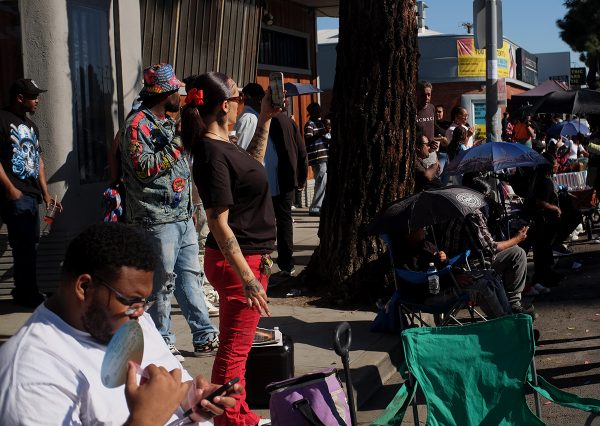
When the parade began an hour later, organizations like labor union SEIU Local 721, civil rights group Black Lives Matter Los Angeles, and HIV care and advocacy nonprofit AIDS Healthcare Foundation marched to cheers and waves from the crowd. Young musicians, drill and cheer teams from Marcus Garvey School and other schools stepped in unison, performing elaborate routines and sending jolting, infectious waves of drum and trumpet like electricity through paradegoers.

Black liberty and joy coalesced with a call to face injustice at yesterday’s festivities. Black Lives Matter Los Angeles members handed out flyers demanding accountability for Keith Porter, who was killed by an off-duty Immigration and Customs Enforcement (ICE) agent on Dec. 31. Marchers also waved the Iranian flag in solidarity with its people, who have faced increasing state-sanctioned violence after they began protesting the government in the midst of an economic downfall.
Communal care and empowerment remain, for many, the only way forward as trust in broader governmental systems and structures wanes. While celebrating the monumental work of the late civil rights activist, community members yesterday echoed an important, resonant message: The work is not yet done.
This community work is largely supported by local advocates and organizations like Center South: one of the Los Angeles LGBT Center’s community sites. Yesterday morning, ahead of the parade, senior program manager Steven Campa and fellow staff members welcomed people into the space for coffee and pastries.
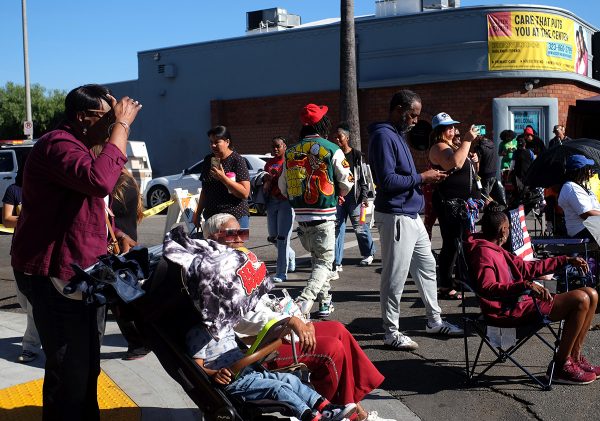
They also handed out flyers introducing residents to the site’s resources, which include: hygiene kits, HIV testing, a free monthly farmers market and clothing closet, mental health and primary care services, substance use and recovery programs, as well as social groups that prioritize LGBTQ+ people of color living in the neighborhood.
Center South opened six years ago, reclaiming a space that once housed a vibrant jazz supper club. At first, the site focused on providing services specifically for men who have sex with men (MSM), regardless of whether or not they identified as a member of the LGBTQ+ community. Over time, Center South became more inclusive of and responsive to the local community as a whole, becoming a safe space for anyone in South L.A. seeking refuge and care.
Campa, who has been with Center South since its founding, emphasized the constantly-evolving nature of the place as it molds itself to best serve and represent its community. Staff members and clinicians are nurtured by their own personal connections to the neighborhood, yearning to give back to the place that raised them.
And that has an effect. “How does it look to have a provider who’s queer: a provider that looks like folks in the community?” Campa said. “We’re our community. Folks grew up [here]…To speak to the MLK Day parade, this was a holiday for the Center. Folks chose to be here. Understanding that we are on MLK Boulevard, we want to continue to do [show up] every year to provide a safe space for the community.”

Campa, his staff members, and fellow Los Angeles LGBT Center staff want to expand what it means to be safe and healthy — and to see that reflected more broadly in their communities. “A healthy person needs medical care [and more],” said the Center’s chief equity officer, Giovanna Fischer, who showed up on Monday to celebrate the parade with the community. “[They also] need food access, immigration support…That’s definitely going to impact their health and wellbeing,” Fischer told the Blade. “
Campa, Fischer, and other advocates are strategizing for their community in uncertain times, as threats to instrumental funding are seemingly always on the table. But as they “forecast for the future” and continue to build a collective vision that uplifts LGBTQ+ people of color, their fight endures. “We deserve to think about where we want to go,” Fischer said. “We deserve the opportunity to dream and scheme, and so does our community. So until further notice, we’re going to continue to do that.”
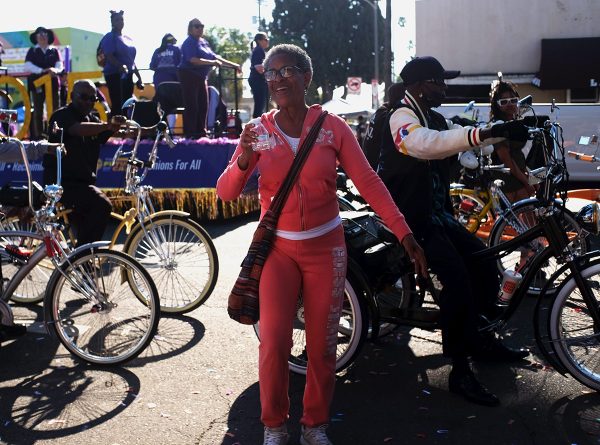
Kristie Song is a California Local News Fellow placed with the Los Angeles Blade. The California Local News Fellowship is a state-funded initiative to support and strengthen local news reporting. Learn more about it at fellowships.journalism.berkeley.edu/cafellows.
Los Angeles
Advocates demand that trans youth be protected as cases are argued in Supreme Court
This week, LGBTQ+ advocates and legal experts spoke in support of trans youth as two Supreme Court cases challenge their rights and safety.

This Tuesday, the Supreme Court heard oral arguments regarding two cases about transgender girls in sports: Little v. Hecox and West Virginia v. B.P.J.
In 2020, Idaho Governor Brad Little signed into law HB 500, which bans transgender girls and women from participating in school sports. This affected the first case’s respondent: transgender student athlete Lindsay Hecox, who was barred from participating in the track and cross country teams as well as intramural soccer and running clubs.
In 2021, then-governor of West Virginia, Jim Justice, approved HB 3293, which enacts a similar ban. Becky Pepper-Jackson (B.P.J.), now an incoming high school student, opposed the discriminatory policy when it prevented her from joining her then-middle school’s cross country and track and field teams. Pepper-Jackson has also only undergone female puberty due to gender-affirming care, but West Virginia argues that its anti-transgender policies should be upheld because of her assigned sex at birth.
For LGBTQ+ advocates and allies, these cases illustrate the burden and harm transgender people face daily as their rights to privacy, dignity, care, and inclusion are constantly at risk of being eroded and stripped completely.
Experts also wonder if these cases could potentially reshape the Constitution’s Equal Protection Clause as well as the civil rights law, Title IX. The former prohibits discrimination on other factors aside from race, though governments have argued that certain “suspect classifications” can be looked at more closely through “heightened scrutiny.” The latter prohibits sex-based discrimination in federally-funded schools.
What is unfolding and how local advocates are informing change:
The fight ahead is weary, and experts are certain that the states involved will not concede their points. In a webinar organized yesterday by the Williams Institute, several LGBTQ+ policy experts, including Rutgers Law School professor and anti-discrimination scholar Katie Eyer, examined where these cases may be heading, as well as efforts to muddy the arguments.
“It seems possible that the court might try to sidestep that issue here by saying that these laws don’t target transgender people at all,” Eyer said. “I think for most people, this seems bananas: like an upside-down world. We all know these laws were about transgender people.”
Jenny Pizer, an attorney for the LGBTQ+ civil rights legal organization Lambda Legal and a co-counsel member for the B.P.J. case, affirmed this sentiment at a press conference organized Tuesday by Lambda Legal and AIDS Healthcare Foundation affinity group, FLUX. “They’ve gone to great lengths to say there’s no discrimination,” Pizer said. “[They’re arguing] it’s just technicalities or classifications.”
Eyer was one of three Equal Protections scholars who filed an amicus brief to be considered in the Supreme Court cases. An amicus brief is a legal document submitted by someone who is not involved directly in a case but who may offer additional perspectives and information that can inform the ruling process.
Eyer’s brief provided historical context that clarified the disadvantages of blanket sex-based policies. These types of laws, according to Eyer, uphold stereotypes over nuance, truth, and equal protection guidelines. For Pepper-Jackson, who has only undergone female puberty and who does not “benefit” from what dissidents define as a sex-based competitive “advantage,” the state should have provided her the ability to argue that she should have the same rights as other girls.
“Of course, the state hasn’t done that here,” Eyer said. “Under these precedents, the Supreme Court should invalidate the laws as applied to those trans girls who really don’t have a sex-based competitive advantage.”
Who are these bills protecting?
The states argue that their policies are merely “ensuring safety and fairness in girls’ sports.” But queer advocates understand that this is a veneer for the exclusion of transgender people from society. Forcing trans youth out of sports “does not protect anyone,” according to California LGBTQ Health and Human Services Network director Dannie Ceseňa, who spoke at Tuesday’s press conference.
“It encourages the scrutiny of children’s bodies. It fuels gender policing, and it creates hostile school environments — not safer ones,” said Ceseňa. “Our youth should not inherit a world that treats their existence as a threat.”
Transgender people are systemically disempowered
At yesterday’s webinar, Distinguished Visiting Scholar at the Williams Institute Andrew Flores discussed his own amicus brief in support of Pepper-Jackson. The brief highlights the need for “heightened judicial scrutiny” in Pepper-Jackson’s case because the majority of political processes “systemically fail” transgender people.
For example, the transgender community faces substantial barriers in exercising their voter rights because of voter identification laws and other policies that regulate and define identity. “Even being able to gain access to the franchise is a burden for transgender people,” Flores said. “The court does play an important role there. It can grant legitimacy to arguments…or at least [acknowledge] that these issues are more complicated than maybe how they’ll receive them.”
What’s next?
Experts are hesitant about where the cases stand. “Bottom line: I don’t know what the court is going to do in these cases. They may send them back down for further development,” Pizer said, who thinks future rulings will not shift more overarching policies regarding transgender rights. “I think they will probably decide based only on laws about sports, not laws more broadly about the rights of trans folks.”
But whatever is decided, the impacts will trickle down to everyone. While the cases deal specifically with anti-transgender policies, experts warn that LGBTQ+ issues have always been tied to racial, economic, and disability justice. “There’s this looming constitutional campaign to really undermine civil rights,” said Eyer. “That affects LGBTQ people. It affects people of color. It affects people with disabilities. It affects everybody, and it really is concerning.”
As transgender inclusion and safety are being argued on the largest legal stage, advocates are asking: “When are you going to step up?” They are also sending a direct message to transgender youth: “We see you, we believe in you, and we are fighting for you,” said Ceseňa. “You deserve joy, community, and care. You deserve a future that reflects who you are and not who anyone or any politician demands you to be. Trans youth deserve better.”
Kristie Song is a California Local News Fellow placed with the Los Angeles Blade. The California Local News Fellowship is a state-funded initiative to support and strengthen local news reporting. Learn more about it at fellowships.journalism.berkeley.edu/cafellows.
U.S. Supreme Court
Competing rallies draw hundreds to Supreme Court
Activists, politicians gather during oral arguments over trans youth participation in sports

Hundreds of supporters and opponents of trans rights gathered outside of the United States Supreme Court during oral arguments for Little v. Hecox and West Virginia v. B.P.J. on Tuesday. Two competing rallies were held next to each other, with politicians and opposing movement leaders at each.
“Trans rights are human rights!” proclaimed U.S. Sen. Ed Markey (D-Mass.) to the crowd of LGBTQ rights supporters. “I am here today because trans kids deserve more than to be debated on cable news. They deserve joy. They deserve support. They deserve to grow up knowing that their country has their back.”

“And I am here today because we have been down this hateful road before,” Markey continued. “We have seen time and time again what happens when the courts are asked to uphold discrimination. History eventually corrects those mistakes, but only after the real harm is done to human beings.”
View on Threads
U.S. Education Secretary Linda McMahon spoke at the other podium set up a few feet away surrounded by signs, “Two Sexes. One Truth.” and “Reality Matters. Biology Matters.”
“In just four years, the Biden administration reversed decades of progress,” said McMahon. “twisting the law to urge that sex is not defined by objective biological reality, but by subjective notion of gender identity. We’ve seen the consequences of the Biden administration’s advocacy of transgender agendas.”

U.S. Rep. Mark Takano (D-Calif.), chair of the Congressional Equality Caucus, was introduced on the opposing podium during McMahon’s remarks.
“This court, whose building that we stand before this morning, did something quite remarkable 6 years ago.” Takano said. “It did the humanely decent thing, and legally correct thing. In the Bostock decision, the Supreme Court said that trans employees exist. It said that trans employees matter. It said that Title VII of the Civil Rights Act protects employees from discrimination based on sex, and that discrimination based on sex includes discrimination based on gender identity and sexual orientation. It recognizes that trans people have workplace rights and that their livelihoods cannot be denied to them, because of who they are as trans people.”
“Today, we ask this court to be consistent,” Takano continued. “If trans employees exist, surely trans teenagers exist. If trans teenagers exist, surely trans children exist. If trans employees have a right not to be discriminated against in the workplace, trans kids have a right to a free and equal education in school.”
Takano then turned and pointed his finger toward McMahon.
“Did you hear that, Secretary McMahon?” Takano addressed McMahon. “Trans kids have a right to a free and equal education! Restore the Office of Civil Rights! Did you hear me Secretary McMahon? You will not speak louder or speak over me or over these people.”
Both politicians continued their remarks from opposing podiums.
“I end with a message to trans youth who need to know that there are adults who reject the political weaponization of hate and bigotry,” Takano said. “To you, I say: you matter. You are not alone. Discrimination has no place in our schools. It has no place in our laws, and it has no place in America.”
-

 Events3 days ago
Events3 days agoMargaret Cho joins headliner lineup for Lambda Legal’s queer comedy night
-

 Television3 days ago
Television3 days agoNetflix’s ‘The Boyfriend’ is more than a dating show
-

 Italy4 days ago
Italy4 days ago44 openly LGBTQ+ athletes to compete in Milan Cortina Winter Olympics
-

 a&e features2 days ago
a&e features2 days agoAngel McCoughtry, “Renaissance Woman”
-

 Movies4 days ago
Movies4 days ago‘Cutaways’ and the risk queer cinema forgot
-

 Movies3 days ago
Movies3 days ago50 years later, it’s still worth a return trip to ‘Grey Gardens’
-

 Los Angeles11 hours ago
Los Angeles11 hours agoProject Angel Food is now able to feed 10,000 people daily with expanded building
-

 Sports1 day ago
Sports1 day agoMichael Ferrera is paving a path of safety and liberation for queer athletes
-

 Arts & Entertainment1 day ago
Arts & Entertainment1 day ago2026 Best of LGBTQ LA Readers’ Choice Award Nominations
-

 Sports2 days ago
Sports2 days agoBlade, Pride House LA announce 2028 Olympics partnership







